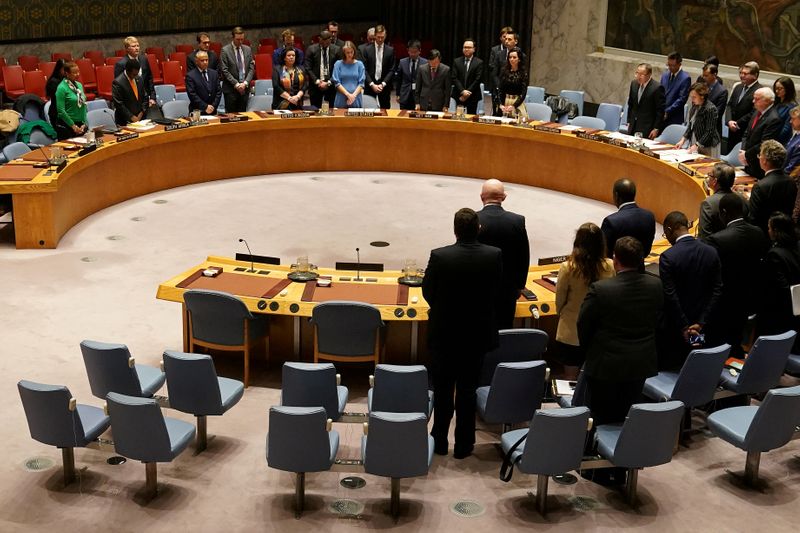By Michelle Nichols
NEW YORK (Reuters) - The United Nations Security Council met for the first time on Thursday to discuss the coronavirus pandemic as the 15-member body - charged with maintaining international peace and security - struggles to agree on whether it should take any action.
U.N. Secretary-General Antonio Guterres privately briefed a virtual council meeting on the disease, which has so far infected some 1.5 million people - killing 90,000 - in more than 200 countries and territories, according to a Reuters tally.
"The pandemic also poses a significant threat to the maintenance of international peace and security - potentially leading to an increase in social unrest and violence that would greatly undermine our ability to fight the disease," Guterres told the council.
"The engagement of the Security Council will be critical to mitigate the peace and security implications of the COVID-19 pandemic. Indeed, a signal of unity and resolve from the Council would count for a lot at this anxious time," he said.
Diplomats have largely blamed Security Council inaction over the pandemic on the United States and China.
Beijing has been reluctant for the council to get involved, arguing it was not within its mandate, while Washington has insisted that any council action refer to the origins of the virus, much to the annoyance of China. The new coronavirus, which causes the respiratory illness COVID-19, first emerged in the Chinese city of Wuhan late last year.
"That is the wrong discussion to have right now about naming the virus. It's COVID-19 ... and it's a threat to international peace and security and the Security Council should have expressed itself on it earlier," said a senior European diplomat, speaking on condition of anonymity.
China's U.N. Ambassador Zhang Jun told the Security Council on Thursday that it should reject any acts of stigmatization and politicization. U.S. President Donald Trump, who labelled the coronavirus the "Chinese virus," last month said Beijing should have acted faster to warn the world.
"To overcome this global challenge, solidarity, cooperation, mutual support and assistance is what we need, while beggar-thy-neighbor or scapegoating will lead us nowhere," Zhang said.
'FIGHT OF A GENERATION'
In recent weeks, council members have been negotiating two draft resolutions. The five veto-wielding powers - the United States, China, France, Russia and Britain - have been discussing a French text. The remaining 10 members - elected for two-year terms - have been discussing a Tunisian draft.
"The eyes of the world are on each of us that are on this Council, and we must act to save lives," U.S. Ambassador to the United Nations, Kelly Craft, told the council on Thursday.
"The most effective way to contain this pandemic is through accurate, science-based data collection and analysis of the origins, characteristics, and spread of the virus," she said.
The council met on Thursday at the request of nine of the elected members. After the meeting the council issued a short statement, agreed by consensus, which expressed support for Guterres' efforts concerning "the potential impact of COVID-19 pandemic to conflict-affected countries."
"We've been waiting for this meeting for quite some time," Belgium's U.N. Ambassador Marc Pecsteen de Buytswerve told reporters. "It was an occasion to demonstrate unity in the council and I hope this is the beginning of making progress also on a resolution."
A resolution by the council could back Guterres' call for a ceasefire in conflicts around the world, push for access for the delivery of humanitarian aid to fight the coronavirus and urge a coordinated global approach to confronting the outbreak.
But the Security Council cannot do much about dealing with the coronavirus itself or addressing the economic consequences of the pandemic, said Richard Gowan, U.N. director for the International Crisis Group think-tank.
"What the council could do is project a bit of international unity in the face of the disease," Gowan said. "After weeks of China and the U.S. bickering about the origins of the virus, a simple statement from the council about the need for cooperation would be a reassuring signal."
A resolution needs nine votes in favor and no vetoes to be adopted. The council has addressed global public health issues in the past, adopting resolutions in 2000 and 2011 on HIV/AIDS and on the Ebola crisis in West Africa in 2014, when it declared the outbreak a threat to international peace and security.

Guterres told the council of the coronavirus outbreak: "This is the fight of a generation - and the raison d'être of the United Nations itself."